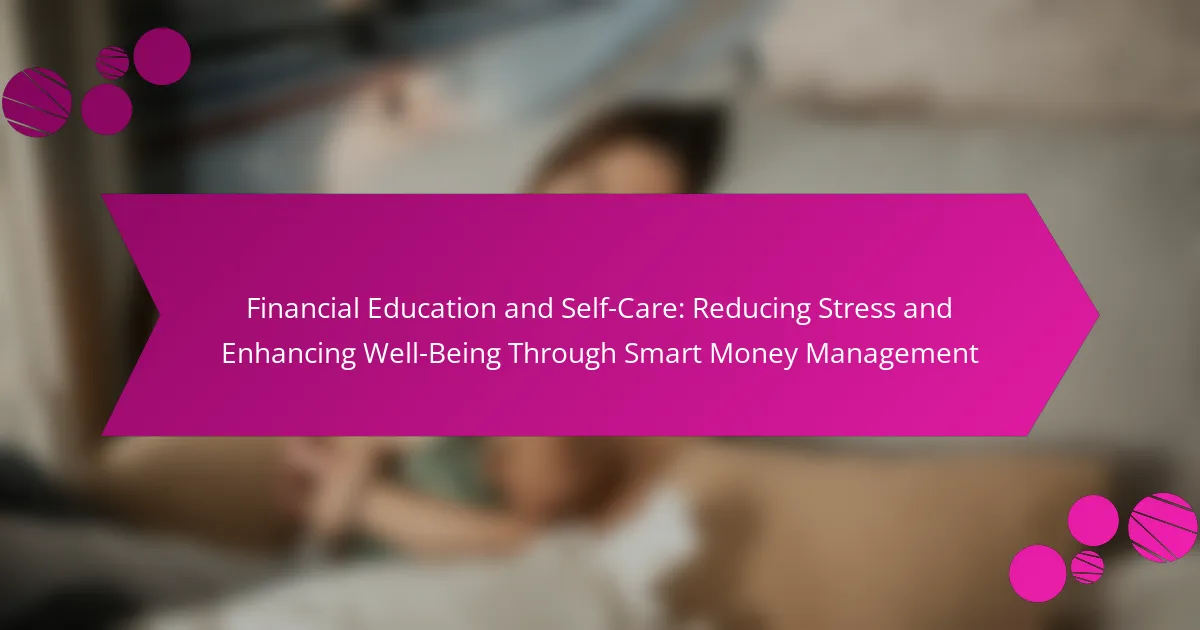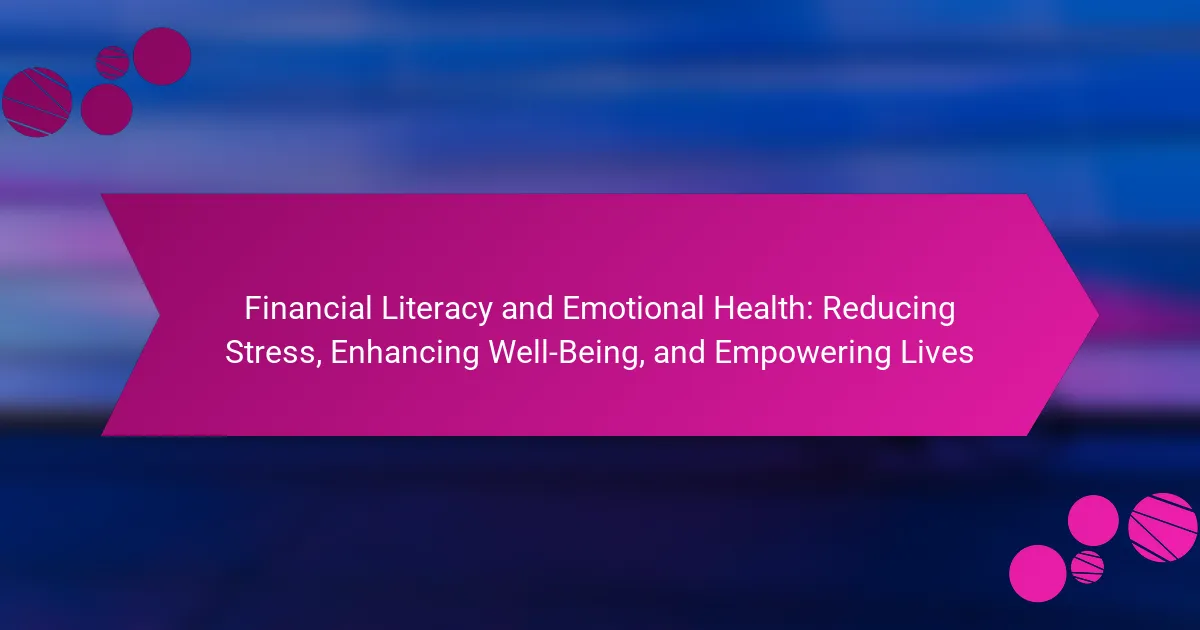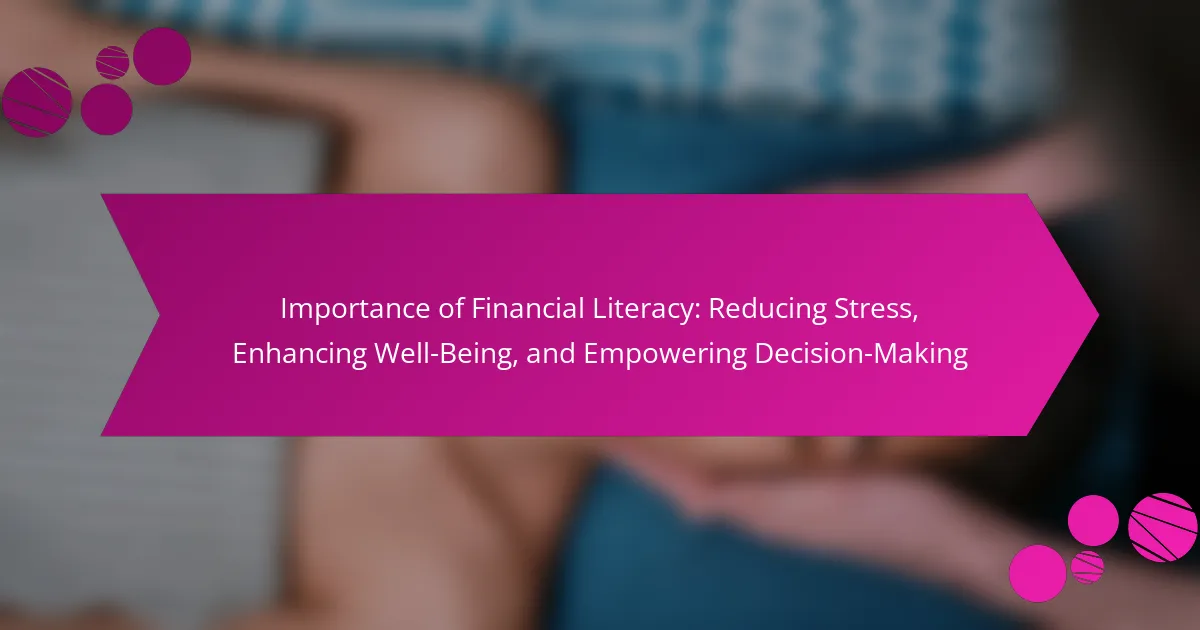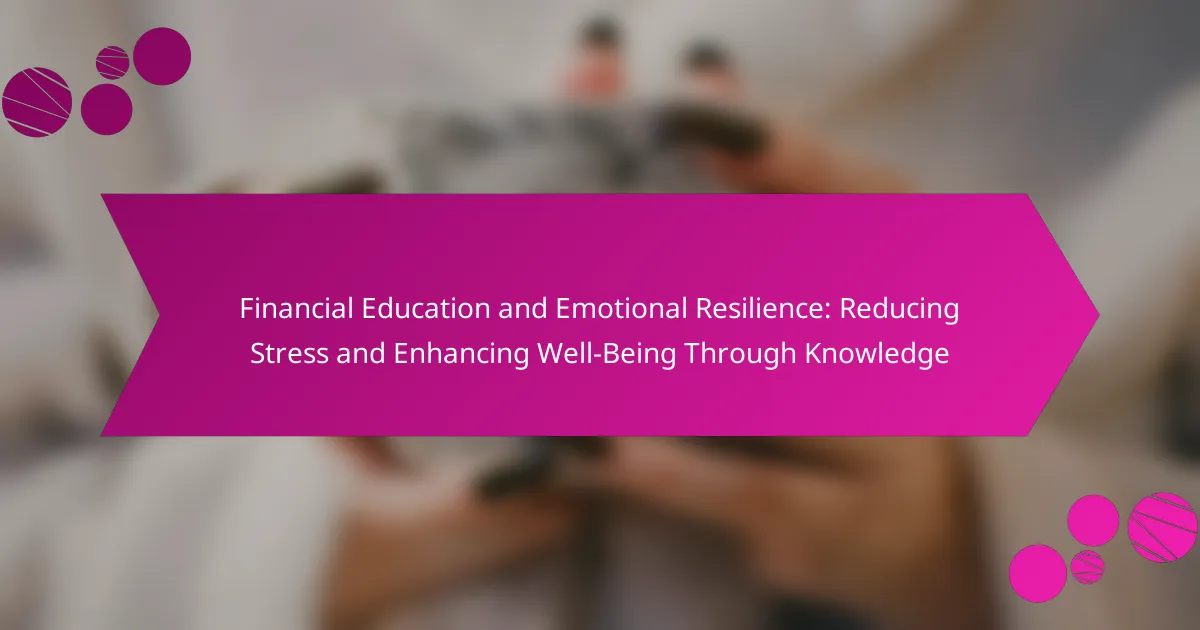Financial literacy plays a crucial role in enhancing relationship satisfaction by mitigating financial stress and fostering effective communication. Couples with strong financial knowledge experience fewer money-related conflicts, which contributes to improved emotional well-being. By promoting transparency and shared financial goals, financial education builds trust and collaboration, laying the groundwork for lasting relationship stability.
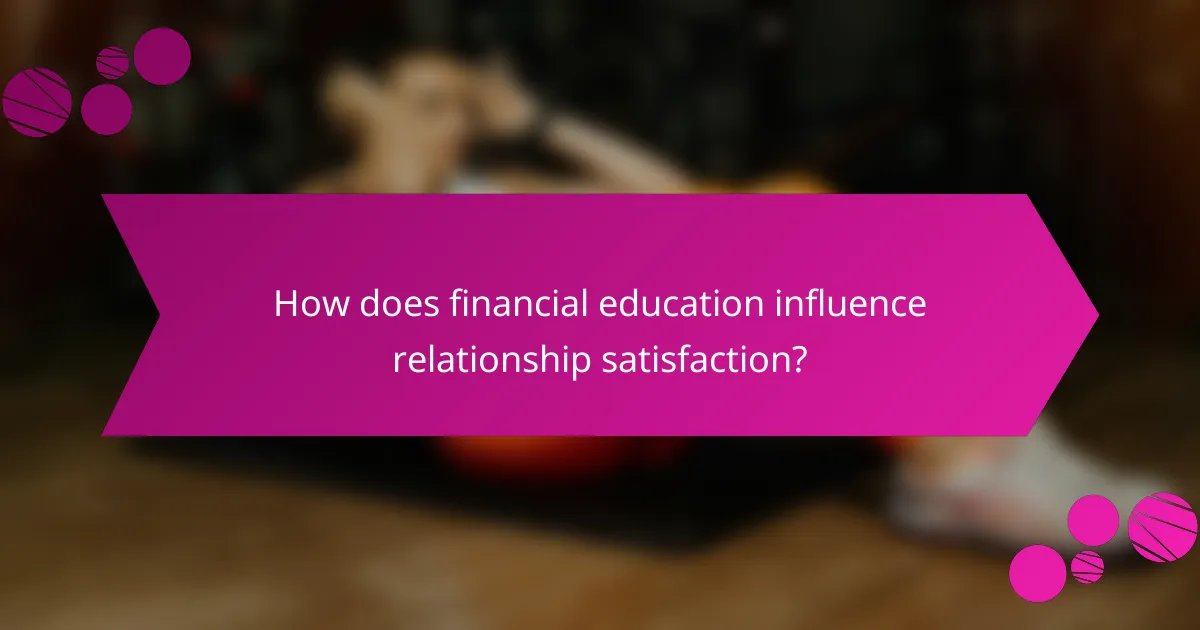
How does financial education influence relationship satisfaction?
Financial education significantly enhances relationship satisfaction by reducing financial stress and improving communication. Couples with strong financial literacy report fewer conflicts related to money, leading to better emotional well-being. Research indicates that financial disagreements are a leading cause of relationship breakdowns. By fostering transparency and shared goals, financial education strengthens trust and collaboration between partners. This shared understanding of finances creates a foundation for long-term relationship stability and satisfaction.
What are the common stressors related to financial issues in relationships?
Common stressors related to financial issues in relationships include debt, income disparity, differing spending habits, lack of financial communication, and financial goals misalignment. These factors can lead to conflict and dissatisfaction.
Debt creates pressure, often resulting in arguments over payments and financial responsibilities. Income disparity can foster resentment, especially if one partner feels undervalued. Differing spending habits may cause disagreements over budgeting and priorities. A lack of financial communication can lead to misunderstandings and mistrust. Finally, misaligned financial goals can create tension, as partners may struggle to agree on saving or investment strategies.
How can financial literacy improve communication between partners?
Financial literacy enhances communication between partners by fostering transparency and reducing misunderstandings. It empowers couples to discuss financial goals, budgets, and spending habits openly. As a result, this shared knowledge alleviates stress and strengthens relationship satisfaction. Financially literate partners are more likely to collaborate on decisions, leading to a healthier dynamic. Studies show that couples who engage in financial discussions report higher levels of trust and intimacy, ultimately enhancing their overall well-being together.
What tools can couples use to enhance financial discussions?
Couples can enhance financial discussions using budgeting apps, financial planners, and communication tools. These resources promote transparency and shared goals.
Budgeting apps like Mint or YNAB help track expenses and set financial objectives together. Financial planners provide personalized advice, fostering informed decisions. Communication tools such as shared documents or messaging apps facilitate ongoing dialogue about finances.
By utilizing these tools, couples can improve their financial literacy, leading to reduced stress and enhanced relationship satisfaction.
What are the psychological benefits of financial education on well-being?
Financial education significantly enhances well-being by reducing stress and improving relationship satisfaction. It empowers individuals with skills to manage finances effectively, fostering a sense of control and confidence. As a result, couples experience lower anxiety levels related to financial issues, promoting healthier communication and collaboration. Financial literacy also contributes to shared goals, reinforcing partnership dynamics and emotional support. Studies indicate that financially literate individuals report higher life satisfaction, linking financial knowledge directly to psychological well-being.
How does financial knowledge reduce anxiety in relationships?
Financial knowledge significantly reduces anxiety in relationships by fostering open communication and mutual understanding. Couples equipped with financial literacy can make informed decisions together, decreasing stress related to money matters. This shared competence enhances trust, leading to increased relationship satisfaction. Studies indicate that financial disagreements are a leading cause of relationship strain, and addressing these through education can mitigate conflict. By improving financial confidence, partners can focus on nurturing their bond rather than worrying about monetary issues.
What unique advantages does financial education provide for couples?
Financial education provides couples with unique advantages, including improved communication, shared financial goals, and reduced stress. These factors enhance relationship satisfaction and overall well-being. Studies show that couples who engage in financial literacy activities report higher levels of trust and collaboration. Additionally, financial education fosters a sense of partnership, allowing couples to navigate financial challenges together. This proactive approach leads to better financial decision-making and increased resilience against economic pressures.
How can understanding financial concepts lead to better decision-making?
Understanding financial concepts enhances decision-making by providing clarity and reducing uncertainty. Improved financial literacy leads to better budgeting, effective saving strategies, and informed investment choices. As a result, couples experience reduced stress and increased relationship satisfaction. Financial knowledge empowers individuals to navigate economic challenges and make collaborative decisions, fostering a sense of security and well-being.
What rare benefits can emerge from financial literacy in relationships?
Financial literacy can lead to rare benefits in relationships, such as improved communication and trust. Couples who understand finances better often experience reduced conflict over money, fostering a stronger emotional connection. Enhanced financial skills can also promote shared goals, leading to greater relationship satisfaction. Research indicates that financial literacy correlates with lower stress levels, which positively impacts overall well-being.
How does financial education foster long-term relationship resilience?
Financial education fosters long-term relationship resilience by enhancing communication and reducing financial stress. Couples with strong financial literacy can navigate challenges collaboratively, leading to greater satisfaction. Studies show that financial disagreements are a significant source of conflict; thus, informed decision-making strengthens bonds. Improved financial knowledge also promotes shared goals, fostering teamwork and trust.
What are the best practices for couples to enhance their financial literacy together?
Couples can enhance their financial literacy together by engaging in open discussions, setting shared financial goals, and participating in educational workshops. Collaborative budgeting improves transparency and trust. Regularly reviewing financial progress strengthens accountability and fosters teamwork. Seeking professional advice can provide tailored insights.
What common mistakes do couples make when discussing finances?
Couples often make several common mistakes when discussing finances, which can hinder their relationship satisfaction. These mistakes include avoiding open communication about money, failing to set shared financial goals, and neglecting to review spending habits together. Additionally, one partner may dominate financial decisions, leading to resentment. Establishing a budget collaboratively and scheduling regular financial check-ins can enhance transparency and cooperation.
How can couples create a financial education plan to reduce stress?
Couples can create a financial education plan by setting shared goals, establishing a budget, and scheduling regular discussions. This approach strengthens communication and reduces financial stress. Start by identifying financial priorities, such as saving for emergencies or planning for retirement. Create a budget that reflects these priorities, ensuring both partners contribute to and understand it. Regular discussions foster transparency and accountability, enhancing relationship satisfaction. Research shows that couples who communicate about finances experience lower stress levels and improved well-being.
What resources are available for couples seeking financial education?
Couples seeking financial education can access various resources to enhance their financial literacy. Online courses, workshops, and financial counseling services are widely available. Nonprofit organizations often provide free resources and tools tailored for couples. Books and podcasts focusing on financial topics can also offer valuable insights. Additionally, financial apps designed for budgeting and goal-setting can facilitate discussions about finances.
How can financial education lead to improved overall well-being in relationships?
Financial education fosters improved well-being in relationships by reducing financial stress and enhancing communication. Couples with strong financial literacy experience less conflict over money, leading to higher relationship satisfaction. Research indicates that financial disagreements are a major source of stress; therefore, understanding budgeting, saving, and investing together strengthens partnership bonds. Moreover, shared financial goals promote teamwork and trust, essential attributes for lasting relationships. Ultimately, financial literacy equips couples with the tools to navigate challenges collaboratively, enhancing overall well-being.
